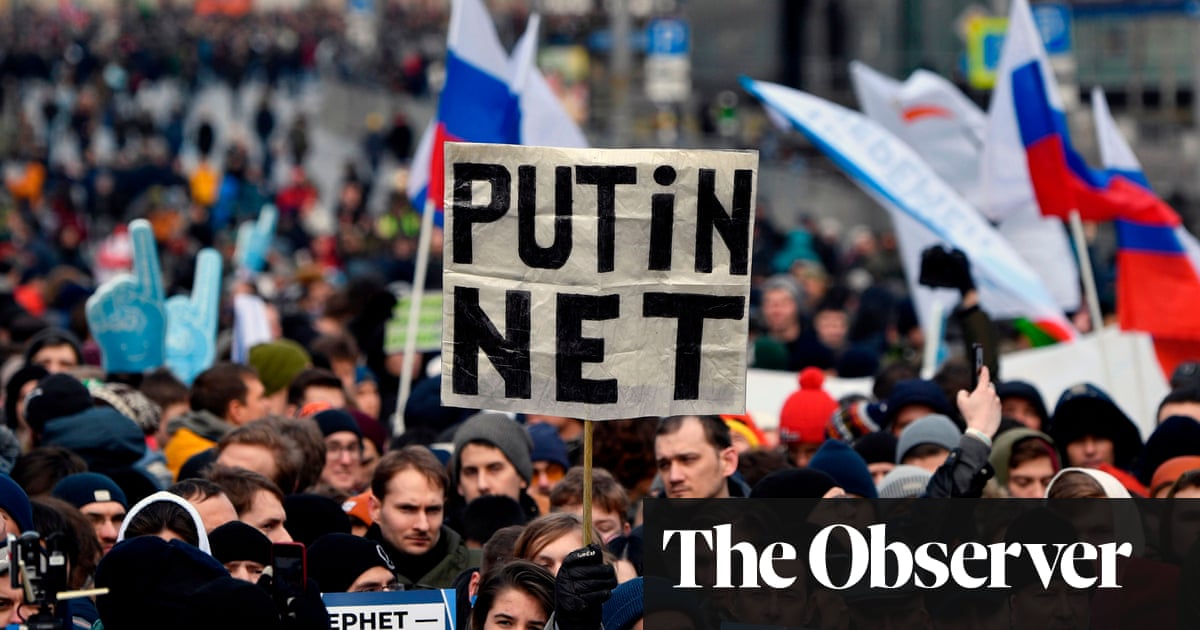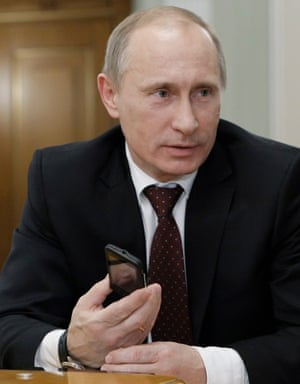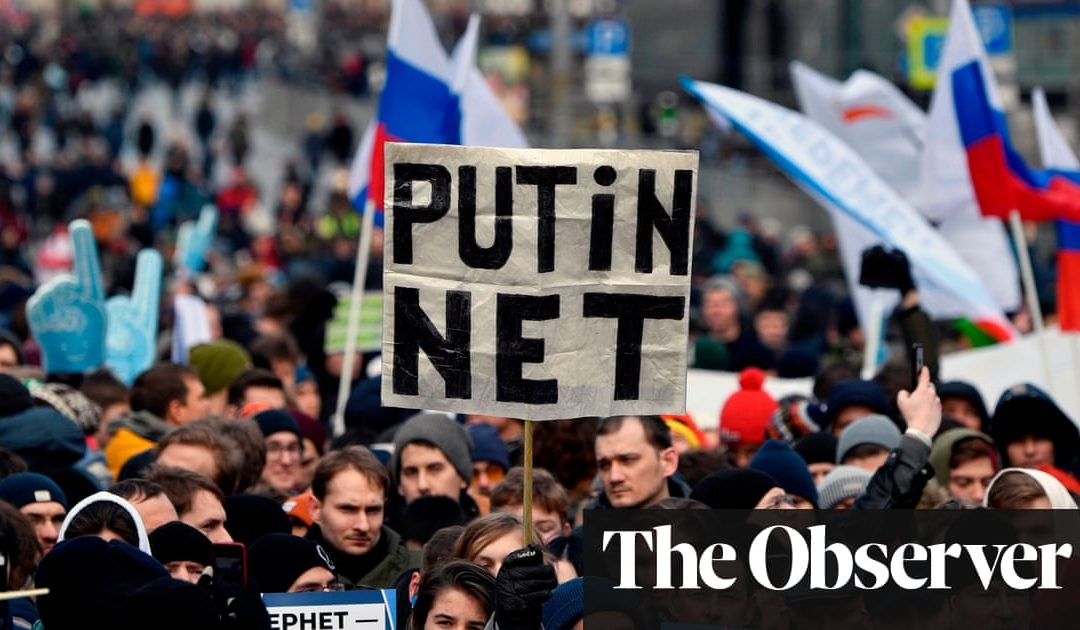Vladimir Putin will soon sign the sovereign internet bill to allow greater monitoring of traffic

Earlier this year, US officials briefed reporters on an extraordinary operation: they claimed to have launched an offensive cyber-attack against Russia to protect the integrity of the countrys midterm elections.
Government hackers from US Cyber Command had pre-emptively cut off the internet to a St Petersburg office building that houses the Internet Research Agency, better known as Russias troll factory, to prevent the spread of misinformation on election day in November 2018, US newspapers reported.
News of the attack, which was never confirmed by Russian officials, did not cause much surprise in Moscow. For years, global connectivity has been portrayed as a dangerous vulnerability in the escalating conflict between Russia and the west.
Days earlier, Vladimir Putin had warned that Russia could potentially be cut off from the global internet entirely. The west might hesitate to attack, he said, only because it could disrupt their spying operations.
[Western intelligence agencies] are sitting online. [The internet] is their creation. And they hear, see and read everything that you are saying and theyre collecting security information, Putin said during a televised interview. But everything is possible in theory. So we must create a segment [of the internet] which depends on nobody.
Earlier this month, Russian lawmakers followed up on Putins recommendations, passing a bill codifying the countrys most ambitious attempt yet to wrangle control over Russias segment of the internet and its connection to the rest of the world.
The sovereign internet bill, which was tabled by lawmakers close to the countrys FSB security service, would require telecoms operators to closely monitor all internet traffic using filtering technology and also create the framework for an on/off switch that could allow Russia to cut itself off from the global internet in case of attack.

The bill, which will probably be signed into law by Putin soon, is seen as a step towards a Chinese-style firewall for Russia, where the internet has largely remained open since the 1990s.
It ought not to be possible, says Keir Giles of the policy institute Chatham House, noting that Russias security services had lobbied to reform the internet segment for years. However, Russia has been preparing for this moment so intensely and for so long that if anyone is capable of undertaking the tech measures required it should be them.
The government has seen the power of hacking operations first hand. In 2008, Russian hackers launched a cyber-attack against Estonia that brought it to a standstill, while cyber-operations were an important element of the 2014 annexation of Crimea from Ukraine.
Since 2016, when Russian military hackers were accused of breaking into the servers of the Democratic National Committee and releasing damaging information about Hillary Clinton, the US has known it is a target.
The US has now said that it wants to impose consequences on people who attack it in cyberspace and the Russians know that means them to a good extent, says James Lewis, a researcher for the Center for Strategic and International Studies (CSIS) in Washington DC.
But critics remain sceptical about whether the overhaul is even possible. While Chinas internet developed with an eye to controlling outside content, by investing fortunes in filtering technology and limiting entry points into the country, Russias has grown with entry points designed to promote the efficient flow of information and integration with the west.
The cost of implementation has been estimated at more than $300m, a number that will probably rise, analysts say. And a test of the system has been delayed as lawmakers recognise the potential disruption it could cause, amid protests from the tech industry.
Critics say that the government has set itself an impossible task that will allow it to peer further into the lives of its citizens without increasing security.
Lawmakers were trying to issue new laws of nature, says Alexander Isavnin, of the RosKomSvoboda movement, which advocates for internet freedom. He helped organise a protest in Moscow last month against the internet bill that attracted more than 15,000 demonstrators.
Most of our regulation of internet, content blocking, data filtering is a way for the government to get more power and information, he says. But if they could not even block [the messenger app] Telegram, how are they going to make a sovereign internet?
Nearly half of Russias internet traffic travels through an exchange point in Moscow called MSK-IX. In their book The Red Web, journalists Andrei Soldatov and Irina Borgan describe the 19-storey building as the heart of the Russian internet. Google rents a room on one floor, while an FSB listening post is located on another.
In order to cut itself off from the global internet, Russia would first have to divert all of its traffic through nationally controlled exchange points such as MSK-IX, where information can be analysed, content filtered and, in case of a crisis, the flow of information from abroad stopped.
Then, Russia will implement a nationally controlled proxy version of DNS, the domain name system that translates URLs into IP addresses and directs user traffic to the servers that websites are run on. DNS acts like a phone directory for the internet and if Russia can implement its own version, a costly fix, then it could control what servers were accessible from within Russia.
For example, the URL for a foreign website, eg the Guardian, or app, eg Facebook, which the government doesnt want allowed into the country could be directed to a dead-end IP address to thwart casual users or to nationally sanctioned, local social media websites. This is commonly used as part of the Chinese great firewall today, says Alex Henthorn-Iwane, of ThousandEyes, a network monitoring company based in San Francisco.
Ideally, a Russian user wouldnt notice much change if the government blocked traffic in and out of the country. Russian websites would continue to work and, the government hopes, users wouldnt have much demand for the sites and services that become inaccessible.
But the process is daunting. It may be straightforward to redirect web traffic from a browser, but international finance and commerce increasingly rely on automated processes that generate cross-border traffic. And the products we use in daily life increasingly require internet connectivity, meaning that the Russian system would have to take into account phones, cars and other consumer products when designing the system.
Unlike China, Russia is densely integrated into the global internet and digital ecosystem, Henthorn-Iwane says. A broad set of critical components of the Russian economy, from financial services to enterprise software-as-a-service applications all depend heavily on interconnections to services outside Russia. A full cut-off that suddenly isolates Russia from the internet would almost certainly disrupt all of these services causing a non-trivial economic impact.
Russia, like other countries, is looking for a way to enjoy the economic benefits of the internet while avoiding the dangers of increased connectivity between people. Lewis of the CSIS says: Countries want to be open for business but closed for politics.
Long before the appearance of the sovereign internet bill, Russia had been seeking ways to limit the spread of information deemed dangerous, building databases of banned websites and occasionally pressing charges against internet users for what they post and like online.
An internet messenger called Telegram was blocked by the government in 2018, but the service had managed largely to overcome the ban by moving between IP addresses, embarrassing the Russian internet regulator, Roskomnadzor.

But the government has shown that it is ready to take drastic action when necessary. During a series of protests last October in the North Caucasus region of Ingushetia, a young demonstrator named Khasan noticed something unusual: he couldnt post photographs to Instagram or write about the protests on Facebook.
In fact, he realised, he couldnt access the internet at all from his telephone and neither could his friends or relatives.
The protesters quickly guessed what had happened. Telecom operators at the request of the Russian government had cut off the internet to a Russian region in an effort to stifle the protests. The government had hoped to suck the oxygen out of the protests by preventing viral images or first-hand accounts of the protests from going public. Television, meanwhile, ignored the unrest.
This was the most important day in years and suddenly the internet just stopped working, says Khasan, who asked that his last name not be published. I knew immediately that this wasnt an accident and why they did it. I just did not realise they could take it away so easily.
As Russia increasingly flexes its muscle abroad, it has targeted utilities in neighbouring Ukraine and has also raised concerns it could attack critical infrastructure for the global internet. Nato military officials warned in 2017 that Russia had stepped up activity around undersea data cables in the North Atlantic and has reportedly developed weapons to be used against satellites.
In the case of an attack, analysts noted, Russia would want to be able to quickly wall itself off from the consequences.
If Russia does wish to reach out beyond its borders and attack critical infrastructure, the extent of the damage, disruption, chaos and economic fallout that would ensue means it would make sense for Russia to try to pre-emptively insulate itself from the consequences, says Giles of Chatham House.
Russia had planned to test the new system before 1 April, but has now moved back plans to implement it until November. In either case, its unlikely to remain a secret. If this is tested on a large scale, I think its going to be pretty obvious, says Giles.
For years, Giles noted, Russias security services have clashed with ISPs over whether the internet was regulated too laxly. Internet service providers have protested against the changes because they would have to install traffic-monitoring equipment under the law and because it would probably hinder internet traffic.
But the conflict comes down to radically different views of the internet and how, increasingly, it is seen as a dangerous avenue for attack from abroad and for protest to develop at home.
Giles says that the ISPs pointed out that if you try to enforce the kind of security that FSB and others had in mind and not allow the free flow of information, then this would break the internet.
Andrew Roth is the Guardian and Observers Moscow correspondent


Recent Comments